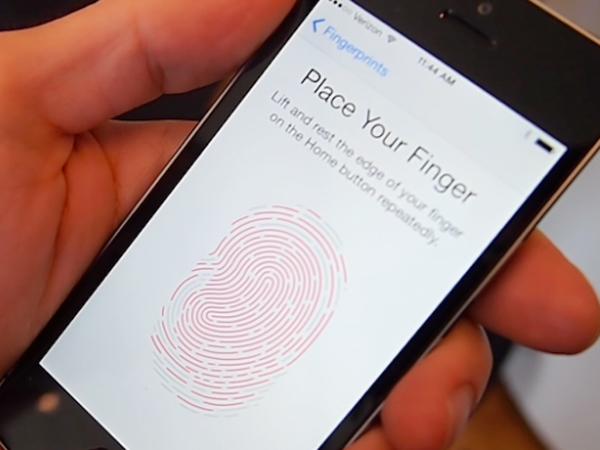Suspect Must Unlock Phone with Fingerprint, Judge Rules
Virginia police can't force suspects to unlock phones with a password, a judge said, but making them do so with a fingerprint is legal.


Locking your smartphone with a fingerprint is usually more secure than locking it with a passcode — until you reach a court of law, that is. A court in Virginia has ruled that while police cannot force someone to unlock a phone with a password, they can indeed require a suspect to unlock it with a fingerprint scan.
The Virginian-Pilot of Norfolk, Virginia reports that a paramedic named David Baust has been accused of domestically abusing his girlfriend, and key evidence in the case may reside on his smartphone. The smartphone is locked with Baust's fingerprint, but Judge Steven C. Frucci has ruled that police can compel Baust to give up his fingerprint so police can try to unlock the device.
MORE: 15 Best Mobile Privacy and Security Apps
The make and model of the phone in question were not identified in the newspaper story, and detailed case records do not appear to be available online, but the only widely used smartphones that offered fingerprint locking at the time of the original domestic-abuse charges in February 2014 were the Apple iPhone 5s and the HTC One Max.
Frucci ruled that while he could not compel Baust to divulge his or her passcode, because that would violate Baust's Fifth Amendment rights against self-incrimination, he noted that a fingerprint is a routine part of most criminal investigations. (Other court rulings have ruled that defendants can be forced to give up passwords, and the legal issue is far from resolved.)
Just as the police can take a fingerprint or DNA sample against a defendant's will, Frucci reasoned, so too can they use a fingerprint to unlock a smartphone.
Bear in mind that even though police can now use Baust's fingerprint to unlock his smartphone, the reasons why are rather tenuous. Baust had video equipment in his bedroom, and the police believe it is possible (but not definite) that some of these videos may now reside on his phone.
Sign up to get the BEST of Tom's Guide direct to your inbox.
Get instant access to breaking news, the hottest reviews, great deals and helpful tips.
Furthermore, if Baust does have a passcode in addition to a fingerprint lock, the police will not legally be able to access his phone, at least not per Frucci's ruling. Prosecutors could still appeal Frucci's decision in an effort to find a judge who disagrees about the Fifth Amendment status of the passcode.
Although the Circuit Court's ruling only applies to Princess Anne County, under Virginia law the ruling can set a legal precedent for the entire state. Other states and the federal government are not bound by the ruling, so it remains to be seen how the issue of fingerprint-vs.-passcode self-incrimination will play out in various jurisdictions across the country.
- BitTorrent Beginner's Guide: Everything You Need to Know
- How to See If AT&T, Verizon Track You Online
- Best PC Antivirus Software 2014
Marshall Honorof is a Staff Writer for Tom's Guide. Contact him at mhonorof@tomsguide.com. Follow him @marshallhonorof and on Google+. Follow us @tomsguide, on Facebook and on Google+.
Marshall Honorof is a senior editor for Tom's Guide, overseeing the site's coverage of gaming hardware and software. He comes from a science writing background, having studied paleomammalogy, biological anthropology, and the history of science and technology. After hours, you can find him practicing taekwondo or doing deep dives on classic sci-fi.
-
Neiihn This is actually interesting given SCOTUS ruled that except for exigent circumstances you need a court order to search a cellphone. So while they can forcibly compel you to unlock the device with a fingerprint would that not make any evidence they found inadmissible anyways if they did not obtain a warrant to search the device to start with?Reply -
anthony8989 Obtaining a warrant to search the device still does not compel the defendant to legally incriminate him/her self by offering the pass code to access the device. So the police would have to - in addition to the electronic search warrant - also have to forensically hack into the device. Which can be especially difficult on an iPhone.Reply
The issue is the 5th amendment right to not incriminate one's self. No warrant can force you to incriminate yourself. -
ammaross ReplyThe issue is the 5th amendment right to not incriminate one's self. No warrant can force you to incriminate yourself.
Your fingerprints are fairly "in plain view" anyway, so quite accessible. Having been arrested, the defendant would already have been compelled to give up fingerprints. Sure, your prints may unlock a phone which could be incriminating, and is thus a 5th Amendment concern, however, if you kept photos in a locked chest and kept the key on a necklace, would it be against your rights to use it to unlock the chest when conducting a lawful (warranted) search? If you think that would be in violation, what about using a photograph of that plainly-visible key to create a copy and thus unlock the chest? Divulging a password could border on self-incrimination (giving self-witness that you truly had access to the passworded resource in question), and can thus be more clearly protected by the 5th amendment. -
anthony8989 You're misunderstanding what I said. I'm not saying requesting finger prints violates his 5th amendment rights. I'm saying (hypothetically) forcing him to use a pin code password to unlock his phone is a violation - according to US law and precedents set by the judges in courts of law - because he is engaging in an act of self incrimination. But since finger print acquisition is a standard practice in the act of arrest, finger print access to the phone is exempt from the protections of the 5th amendment.Reply -
sandysfaves It seems to me that the fingerprint in this type of situation is a passcode so I don't understand why it isn't protected. Fingerprinting itself is just mainly intended to identify someone. Seems to me that fingerprinting and DNA are mainly used to try and match up evidence that is already present such as blood, hair, etc present at the scene of a crime, not evidence that may or may not exist so forcing him to unlock the phone could essentially be self incriminating. I don't know, it boggles my little pea brain and I have a hard time understanding some of the finer points of law anyway I guess.Reply -
anthony8989 I believe the reasoning is that the finger print information is in police and prosecution possession at the time of trial and therefore the data can be used to unlock the phone without violating his rights to not self-incriminate. A hypothetical pin code is never in police or prosecution possession and is only in the possession of the defendant who is attempting to defend themselves from charges.Reply -
LordConrad I've been warning people of this since day one. Fingerprints and DNA can be subpoenaed, knowledge (such as passwords) are protected by the Fifth Amendment. While some courts may try to force you to give up a password, such actions would never hold up under appeal.Reply -
Spanky Deluxe TouchID on the iPhone only works if the device has been used in the last 48 hours, hasn't been restarted since last entry or three failed attempts at fingerprint scanning haven't occurred. The chances of this ever actually being used in a case are next to none due to this.Reply -
anastasios912 Time to subpoena the Mythbusters crew I guess (that one episode where they dupe the fingerprint scanners...)Reply -
f-14 ammaross in america, if you build a government proof anything, by law even with a warrant they can not legally compel you do let them in or access anything. the warrant just removes your legal right to refuse entry with out you killing them in the door way.Reply
the judge is wrong and there is no checks and balances on the judges, police or court system to deal with immediate abuses except the laws on the books concerning false arrest, conspiracy, sedition, and treason laws which allow any one to forcibly stop government workers of any position in some cases with deadly forces if required. it's been ruled constitutional by a great many supreme court cases, not very recently since party line appointed judges have been installed into power however.
corrupt judges can only be removed by a superior court panel and only in a review of previous actions. the wheels of justice are slow. that's why we have the court of appeals...incase you get stuck with a corrupt or dumb judge.
a smart justice official would have already unlocked this phone using the booking print on file of an arrested suspect, if the suspect was never arrested tho... the court is SOL.

